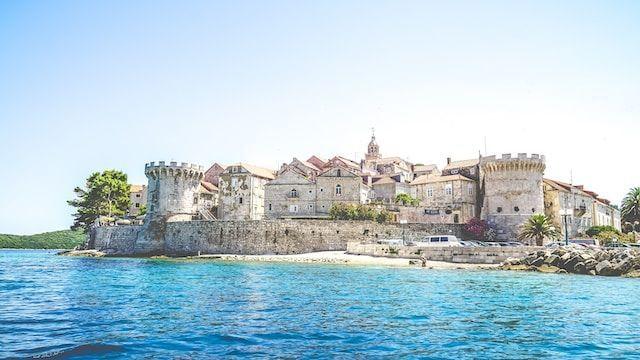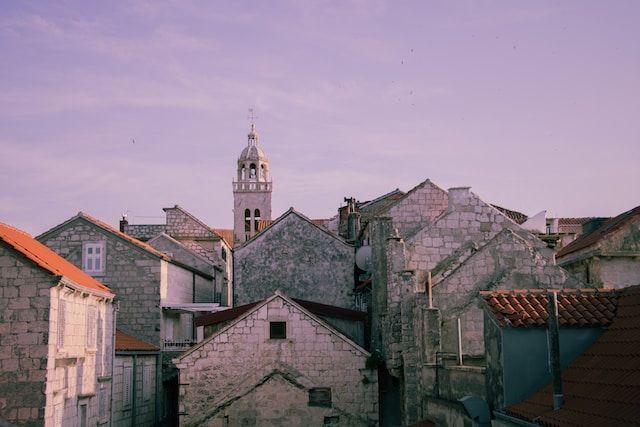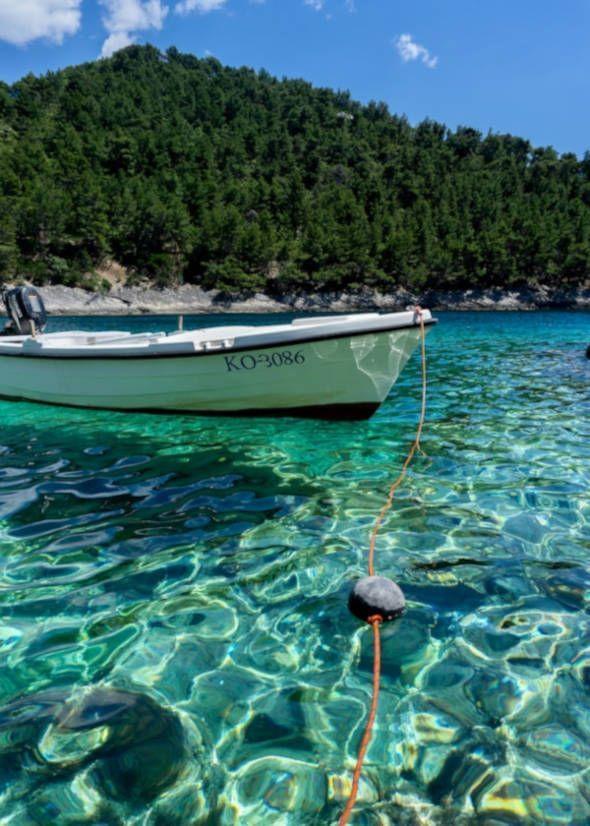Korcula Travel Guide: Notes for Exploring Korcula
Korcula is a wonderful tourist destination thanks to its natural beauty and rich history. In this Korcula travel guide you will find the necessary information to plan your vacation in this beautiful city.
General Information of Korcula
If you are thinking of taking a trip to Korcula, keep reading, because you will find everything you need to organize your vacation.
Korcula is an island located in the Adriatic Sea, off the coast of Croatia. It is part of Dubrovnik-Neretva County and is located about 120 kilometers northwest of Dubrovnik.
The island has an area of approximately 279 square kilometers and a population of around 16,000. It is known for its natural beauty, rich history, and medieval charm.
The island's main town, also called Korcula, is located in the far northeast and is a popular tourist destination.
The city is surrounded by well-preserved walls and its historic center is a maze of narrow cobbled streets and traditional stone houses. Also, it is famous for being the birthplace of the explorer Marco Polo.
In addition to its historical and architectural appeal, Korcula boasts beautiful beaches and crystal clear waters that attract visitors in search of sun and sea. The island is also known for its rich winemaking tradition, and you can visit a number of wineries where high-quality local wines are produced.
The island of Korcula offers a wide range of activities for visitors, such as boat trips, water sports, cycling and hiking. You can also find numerous restaurants and cafes offering local and international cuisine.

Old buildings and sea
Picture of Hilthart Pedersen on Unsplash
Location of Korcula
Below, we show you where is Korcula located:
Map of Korcula on Google Maps
Places to Visit on Korcula
Thanks to its rich historical heritage and stunning natural beauty, Korcula attracts numerous visitors every year. Here we mention some of the main places of interest in Korcula.

Picturesque buildings on a sunny day
Picture of Tom Forrest on Unsplash
Korcula Old Town
Korcula Old Town is a beautiful walled town located on the island of Korcula, in Croatia. The city has a rich history dating back to Roman times, and has been inhabited by various peoples and cultures over the centuries.
The walled city is one of the best examples of medieval architecture in Croatia, and it is located in a privileged position on the eastern end of the island. The city is surrounded by a well-preserved stone wall dating from the 13th century, and is made up of narrow cobbled streets that crisscross in a maze.
One of the main attractions of Korcula Old Town is the Cathedral of Saint Mark, which is located in the heart of the city. This Gothic church was built in the 15th century and has an impressive façade and a 45-meter-high bell tower.
Another place of interest in the Old Town of Korcula is the house of Marco Polo, which is located on Zakerjan street.
In addition to St. Mark's Cathedral and Marco Polo's house, Korcula Old Town features numerous churches, palaces and historical buildings dating from different eras.
One of the most notable is the Bishop's Palace, which was built in the 18th century and today houses the Korcula Town Museum.
The House of Marco Polo
Marco Polo's House is a modest stone structure located on Zakerjan Street in the Old Town of Korcula, Croatia. This house is believed to be the birthplace of the famous explorer Marco Polo.
Marco Polo was born in 1254 into a family of Venetian merchants who resided in Korcula. According to legend, Marco Polo spent much of his childhood in the stone house on Zakerjan Street, which has been restored and turned into a museum that tells the story of Marco Polo's life and travels.
The house itself is a modest stone structure with three floors. On the ground floor, there is a small souvenir shop that offers products related to the life and work of Marco Polo.
On the second floor, there is the main exhibition of the museum, which tells the story of Marco Polo's life, his travels and his work.
The exhibition is organized around various themes, such as Marco Polo's life in Korcula, his travels to Asia, his work as a merchant, and his return to Venice. Visitors can view historical artifacts, maps, and depictions of their adventures.
Badija Island
Badija Island is an island located in the Korcula archipelago, off the coast of Croatia. The island is known for its natural beauty and rich history.
The island has been inhabited by Franciscan monks since the 15th century. The monks built a monastery and a church on the island, as well as a small village for local residents.
For centuries, Badija Island was an important religious and cultural center of the region. The monks grew their own food and were experts in making wine and olive oil.
In the 20th century, Badija Island became a popular tourist destination. Visitors flock to the island to enjoy its pebble beaches and crystal clear waters, as well as to visit the monastery and church.
Today Badija Island is a very popular tourist destination on the Croatian coast. Visitors can reach the island by ferry from the town of Korcula, and can spend the day enjoying the beaches, visiting the monastery and church, and exploring the island on foot.
Pupnat
Pupnat is a village on the Croatian island of Korcula, located in the center of the island, surrounded by hills and fields of olive trees and vineyards. The town is known for its rich history and culture, as well as its beautiful architecture and natural landscapes.
The history of Pupnat dates back to Roman times, when the island of Korcula was an important commercial and transport center.
During the Middle Ages, Pupnat became an important religious and cultural center, and in the 13th century, the church of Saint John the Baptist was built, which is still one of the most important places in the village.
In the 19th century, Pupnat became a center of olive oil and wine production, and the town's economy flourished. The town's architecture reflects this era, with many houses and buildings built in neoclassical and baroque styles.
Today, Pupnat is a quiet and picturesque place that attracts many tourists looking to enjoy the natural beauty of the island and the rich culture and history of the region.
Visitors can stroll through the cobbled streets of the village, visit the church of San Juan Bautista and enjoy local products such as wine and olive oil.
Eating in Korcula
Korcula's gastronomy is a reflection of its rich culinary history and its location on the Adriatic coast. Traditional Korcula food is characterized by the freshness and quality of local ingredients, as well as the influence of Mediterranean and Balkan cultures.
Fish and shellfish dishes are especially popular on the island. Grilled octopus, stuffed squid, roasted fish and fish soup are some of the most outstanding dishes of the local gastronomy.
The fish is grilled or steamed with local herbs and spices, and served with fresh vegetable and herb salads.
Another traditional Korcula dish is roast lamb, which is slowly cooked in a wood-fired oven and served with potatoes and local vegetables. Korcula lamb is especially valued for its flavor and quality, thanks to the natural diet that the animals receive on the island.
Local vegetable dishes are also very popular on Korcula, with ingredients such as aubergines, tomatoes, peppers and zucchini being used in a variety of dishes. The island's highlight vegetable dish is peka, a mix of vegetables and meat slowly cooked in a wood-fired oven.
As for desserts, the fig cake is one of the most popular on the island. The fig is a fruit indigenous to Korcula and is used in a variety of local desserts, including pies and jams.
The Cultural Identity of Korcula
Korcula is an island rich in culture and traditions. The historic city center of Korcula is one of the most outstanding examples of medieval architecture on the Adriatic coast, with its fortifications, cobbled alleyways, and the impressive St. Mark's Cathedral.
The island has a long tradition of music and dance, celebrated in festivals and cultural events throughout the year. One of the most popular is the Feast of Saint Thomas, which is held in the village of Smokvica in September.
At this festival, the villagers perform the famous Moreška dance, a representation of the fight between Christian and Muslim knights.
Korcula is also known for its crafts, especially wood carving and needlepoint production. Local artisan products can be found in the shops and markets of the island.
In general, the culture of Korcula is rich and diverse, with a long history of music, dance, crafts and gastronomy that can be experienced through its festivals, events and local products.
How to Get to Korcula
To get to Korcula, there are several options available:
- By plane: The nearest airport to Korcula is Dubrovnik Airport (DBV). From there you can take a taxi or a bus to Dubrovnik port and then a ferry to Korcula. The total duration of the trip can vary depending on the schedules of the ferries, but generally it takes around 3 to 4 hours.
- By ferry from Dubrovnik: If you are in Dubrovnik, you can take a direct ferry from the port of Dubrovnik to Korcula. Ferries usually operate daily and the journey takes approximately 2 hours. It is advisable to check the ferry schedules in advance, as they can vary depending on the season.
- By ferry from Split: If you are in Split, you can take a ferry from Split port to Korcula. Ferries generally operate daily and the journey takes approximately 2 hours and 30 minutes. As with the previous option, it is advisable to check the ferry schedules in advance.
- By ferry from other Croatian islands: Korcula is connected by ferry to other nearby islands such as Hvar and Brač. If you are on one of these islands, you can take a ferry to Korcula. The times and duration of the trip may vary depending on the island of departure, so it is important to check the times in advance.
How to Get Around in Korcula?
Korcula is a Croatian island that offers a wide variety of options to get around and explore its different locations and landscapes.
One of the most popular ways to get around Korcula is by car. The island has a network of roads that connect its different towns and places of interest, which allows the visitor to move comfortably and quickly.
Another interesting option is the rental of bicycles or motorcycles. On the island there are various companies that offer these services, which allows the visitor to move in a more ecological way and enjoy the landscape in a closer and more authentic way.
There are also public transport services, such as buses and ferries, connecting Korcula with other nearby islands and with the city of Dubrovnik on the Croatian coast. These services usually have limited hours, but they are a good option for those looking for an economical and comfortable alternative.
Private Transfer in Korcula
If you are looking for the most comfortable and safest option to get to Korcula and move carelessly around the city, here you will find the information you need to book your private transfer with Greca, with experienced drivers and no surprise charges.
Beaches of Korcula
Korcula has several beautiful and picturesque beaches for visitors to enjoy the sun and the sea. We tell you about some of the most outstanding beaches of Korcula.

Crystal clear water, boat and vegetation
Picture of Adrien Brun on Unsplash
Pupnatska Luka
A picturesque beach in a sheltered bay with crystal clear waters ideal for swimming and snorkeling.
Vaja Beach
A pebble beach with calm, shallow water that is perfect for families with small children.
Bacva Beach
A white sand beach with crystal clear, shallow waters, ideal for sunbathing and swimming.
Lumbarda Beaches
There are several beaches in the city of Lumbarda, including Pržina and Tatinja, which offer shallow, crystal-clear water, ideal for water sports.
Bili Zal Beach
A pebble beach surrounded by pine trees, with crystal clear waters and plenty of water activities, including kayaking and paddle boarding.
Proizd Island
A small island near Korcula with a stunning white sand beach and crystal clear water, ideal for those looking for a quiet getaway.
When to Visit Korcula
Korcula is a charming destination that you can visit all year round. However, there are certain times of the year that are considered especially attractive to fully enjoy all that the island has to offer.
Summer, which runs from June to September, is the high season in Korcula. During this period, the weather is warm and sunny, with temperatures ranging between 25 and 30 degrees Celsius.
In turn, in summer the beaches are at their best, perfect for enjoying a refreshing dip in the crystal clear waters of the Adriatic Sea. In addition, Korcula's nightlife comes alive during the summer, with numerous restaurants, bars and clubs offering entertainment and special events.
Spring (April to May) and Autumn (October) are also ideal times to visit Korcula. During these periods, temperatures are milder, with averages ranging between 15 and 20 degrees Celsius.
During these times the island's vegetation is in full bloom in spring, and autumn colors embellish the landscapes in the fall.
These seasons are perfect for exploring the charming Old Town of Korcula without the crowds of high season, as well as enjoying outdoor activities such as hiking and cycling.
Winter in Korcula, which runs from December to February, is the low season. During this time, temperatures are cooler, averaging around 10 degrees Celsius.
However, if you are looking for a quiet and authentic island experience, winter may be a good option. You can stroll through the quiet streets of the city, visit the local museums and enjoy traditional cuisine in the cozy restaurants.
Destinations Near Korcula
Korcula is an excellent destination thanks to its historical heritage, its culture and its natural beauty.
In turn, due to its proximity to Hvar and Split, many travelers combine their visit to Korcula with these destinations, which is why you will find these sites in several of our offers.
Are you looking to marvel at amazing beaches? Do you want to know a fascinating culture? Do you want to enjoy a great gastronomic offer?
If your answer is "yes", at Greca we have several proposals for tourist packages to Korcula, which you can modify and adapt according to your needs and times.
There are travel packages for all tastes. Choose your own adventure according to your needs!
More Travel Guides!
If you have been interested in our Korcula travel guide and want to continue learning about this and other wonderful destinations, we invite you to look at the section of all our Travel Guides. Plan your next adventure with Greca!